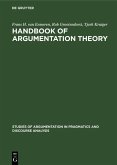This book explores the construction of agreement in the argumentative process, aiming to investigate how the activation of shared knowledge, values and beliefs leads to the creation of a common ground between the speaker and the audience in the pursuit of persuasion. In the first part of the book, the authors examine agreement from a historical and theoretical perspective, setting in relation major ancient and contemporary approaches to argumentation, with special regard for the notions of ethos, objects of agreement, starting points and topoi, all with a focus on their deployment in discourse. This is complemented with a compendium of linguistic resources that can be exploited for the discursive construction of agreement, offering a principled selection of structures across different levels of language description. The second part of the book is devoted to the investigation of actual uses of agreement in a choice of institutional genres within the domain of the US presidential elections: the Presidential Announcement, the TV debate and the Inaugural Address. Due to their political relevance and cultural salience, these genres provide an ideal interface for observing the interplay of discursive and argumentative components, against the backdrop of a shared cultural heritage, rich with intertextual references. The application of the theoretical framework developed in the first part of the book to the analysis of real political discourse carried out in the second is the distinguishing feature of this volume, making it of interest to linguists and argumentation scholars, as well as to political scientists and communicators.
Dieser Download kann aus rechtlichen Gründen nur mit Rechnungsadresse in A, B, BG, CY, CZ, D, DK, EW, E, FIN, F, GR, HR, H, IRL, I, LT, L, LR, M, NL, PL, P, R, S, SLO, SK ausgeliefert werden.









